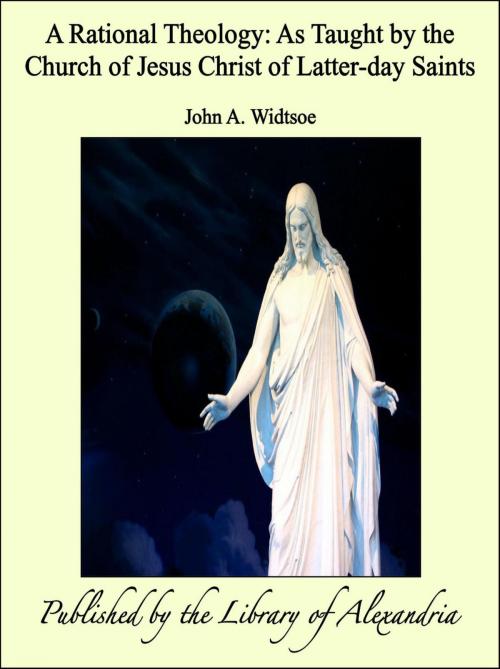A Rational Theology: As Taught by the Church of Jesus Christ of Latter-day Saints
Nonfiction, Religion & Spirituality, New Age, History, Fiction & Literature| Author: | John A. Widtsoe | ISBN: | 9781465562630 |
| Publisher: | Library of Alexandria | Publication: | July 29, 2009 |
| Imprint: | Library of Alexandria | Language: | English |
| Author: | John A. Widtsoe |
| ISBN: | 9781465562630 |
| Publisher: | Library of Alexandria |
| Publication: | July 29, 2009 |
| Imprint: | Library of Alexandria |
| Language: | English |
A rational theology, as understood in this volume, is a theology which (1) is based on fundamental principles that harmonize with the knowledge and reason of man, (2) derives all of its laws, ordinances and authority from the accepted fundamental principles, and (3) finds expression and use in the everyday life of man. In short, a rational theology is derived from the invariable laws of the universe, and exists for the good of man. This volume is an exposition; it is not an argument. The principles of the Gospel, as held by the Church of Jesus Christ of Latter-day Saints, are stated, briefly, simply and without comment, to show the coherence, reasonableness and universality of the gospel philosophy. The authority for many of the statements found in the volume is given in the references included in the appendix. The doctrines herein stated are, however, the common knowledge of the members of the Church. No attempt has been made to correlate the doctrines discussed with current philosophical opinions. Those who are led to study this rational theology in the light of the best knowledge and soundest thought, will enter a fertile field, and will find a surprising harmony between the Gospel and all discovered truth. could not be made larger, were it to serve well the special purpose for which it was written. Therefore, the treatment is brief and many important and interesting subjects are omitted. Moreover, had to be completed within a short, set time, and many of the imperfections of the work are the results of the hurried preparation. Every writer who in this day attempts an exposition of the Gospel must draw heavily upon the clear thoughts of those who, from Joseph Smith to the living workers, have written and spoken in behalf of the truth. I acknowledge, gratefully, my obligation to the makers of "Mormon" literature. Many friends have, also, in various ways, given kindly aid; to them I offer hearty and sincere thanks
A rational theology, as understood in this volume, is a theology which (1) is based on fundamental principles that harmonize with the knowledge and reason of man, (2) derives all of its laws, ordinances and authority from the accepted fundamental principles, and (3) finds expression and use in the everyday life of man. In short, a rational theology is derived from the invariable laws of the universe, and exists for the good of man. This volume is an exposition; it is not an argument. The principles of the Gospel, as held by the Church of Jesus Christ of Latter-day Saints, are stated, briefly, simply and without comment, to show the coherence, reasonableness and universality of the gospel philosophy. The authority for many of the statements found in the volume is given in the references included in the appendix. The doctrines herein stated are, however, the common knowledge of the members of the Church. No attempt has been made to correlate the doctrines discussed with current philosophical opinions. Those who are led to study this rational theology in the light of the best knowledge and soundest thought, will enter a fertile field, and will find a surprising harmony between the Gospel and all discovered truth. could not be made larger, were it to serve well the special purpose for which it was written. Therefore, the treatment is brief and many important and interesting subjects are omitted. Moreover, had to be completed within a short, set time, and many of the imperfections of the work are the results of the hurried preparation. Every writer who in this day attempts an exposition of the Gospel must draw heavily upon the clear thoughts of those who, from Joseph Smith to the living workers, have written and spoken in behalf of the truth. I acknowledge, gratefully, my obligation to the makers of "Mormon" literature. Many friends have, also, in various ways, given kindly aid; to them I offer hearty and sincere thanks















